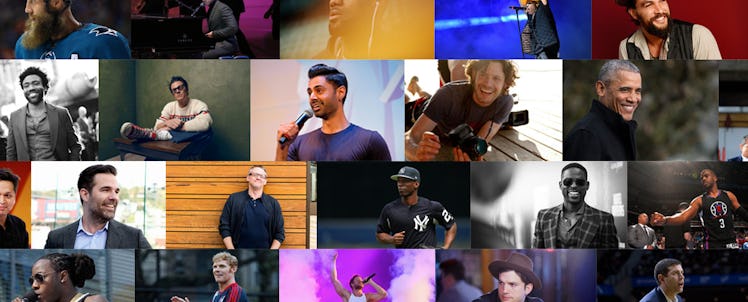What Does It Mean To Be a Cool Dad?
Does dadness negate coolness or can the two work in concert?

Cool Dad: seven letters, eight, counting spaces, and yet so much to unpack. A few months ago, before we at Fatherly set about thinking who to name to our first annual list of Cool Dads, we first had to consider what makes a cool dad cool. The in-office bickering continues, but there are some qualities on which have reached consensus.
Let’s start with the Dad part because it’s pretty straightforward. Every cool dad is a father. Some are new. Some are old. Some are biological. Some are adoptive. Some are straight. Some are queer. Some are accountants. Some are cowboys. The critical thing is that they are all responsible for kids and that they all have agreed to take on that responsibility. You can’t be a cool dad and not show up. Part of this is about wearing that responsibility well.
Dads that give up in the traditional Nike-Monarchs-and-an-ill-fitting sweatshirt sort of way do their children a disservice by teaching them a bad lesson about identity.
I’ll note here that one thing the staff of Fatherly reached consensus on quickly was that children should not be empowered to determine coolness because they’re not good at it. They tend to need time and distance to assess the qualities of both their parents and other people’s parents. By that time, they are children no longer. Part of fatherhood is accepting that the performance review will arrive too late to help.
As for cool, that elusive appellation is ineffable — up to a point. The term “cool dad” relies on an implied tension between the two words. Dad is, for various poppycock cultural reasons, perceived to be at odds with cool. That informs our interpretation of cool in this context. We’re not talking about fathers who do charity work, though being charitable is great. There’s no twist there. It’s not surprising that responsible men tend to take on additional community responsibilities. It is, however, surprising when responsible men are hip or, let’s not walk around it, sexy — doubly surprising when part of the appeal is a passion that extends beyond their families.
When it comes to father-child interactions, coolness is no virtue.
What we found as we researched and discussed cool dadness was that the men who stood out did something inspirational and comported themselves in an inspiring way while doing it. For instance, Brandon Cardet-Hernandez, who is a high school principal in the Bronx, attacks his educational agenda with the same iconoclastic intensity that Donald Glover, an undebatably cool man, brings to remaking television in his own image. (It doesn’t hurt that Cardet-Hernandez is also very good looking.)
It’s important to dwell here on the relationship of the words cool and dad. Cool is a descriptor of the man who is a dad, not of a parenting style. Parenting in a cool way might be possible on some level, but performative parenting, prioritizing the opinions of others over the wellbeing of one’s kids, sucks. Good parenting is all about attentiveness, presence, and the ability to adjust to shifting situations. When it comes to father-child interactions, coolness is no virtue.
That said, coolness is a virtue in life. And dads that give up in the traditional Nike Monarchs and an ill-fitting sweatshirt sort of way do their children a disservice by teaching them a bad lesson about identity. Cool dads are not important because they are dads and they are not dads because they are cool (well… that might not be totally true.). Cool dads matter because they are cool and they are dads. Cool dads prove that multiple identities can flourish simultaneously.
The ability to be multiple things to multiple people while also being true to oneself must be carefully cultivated. It’s hard. Cool dads are exceptional because they are good at it. Cool dads are exceptional because they have self-confidence, swagger, and drive — all admirable traits — but also because none of that crowds out the love.
This article was originally published on